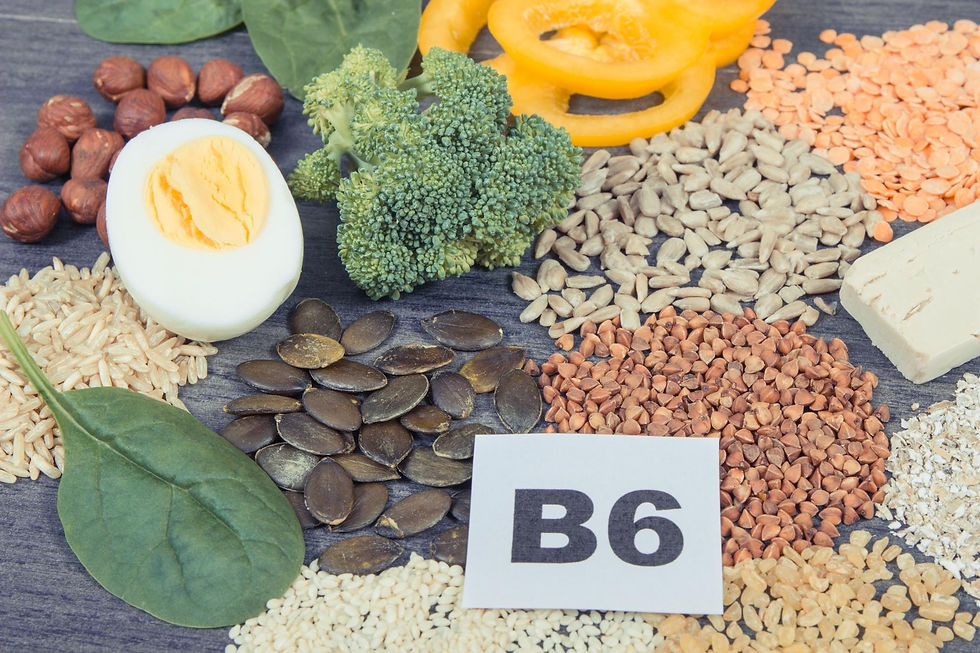What Is Vitamin B6 and How It Helps PMS
- zachsievert15
- Dec 31, 2024
- 4 min read
Updated: Dec 31, 2024
Hormonal fluctuations and the discomfort of PMS, or premenstrual syndrome, affect many women. These symptoms can range from mild inconvenience to severe disruption of daily life. Vitamin B6 is a nutrient that has shown promise in supporting women through PMS and other hormonal changes, including perimenopause and postmenopause. But what is vitamin B6, and how does it help with PMS?

Understanding Vitamin B6
Vitamin B6, also known as pyridoxine, is a water-soluble vitamin that plays an essential role in the body. It’s involved in over 100 enzyme reactions, primarily related to protein metabolism, neurotransmitter function, and hemoglobin production. This vitamin is found in various foods like poultry, fish, bananas, potatoes, and fortified cereals.
Vitamin B6 is critical for brain health, immune function, and maintaining proper energy levels. Its role in synthesizing neurotransmitters such as serotonin and dopamine makes it especially important for mood regulation, which directly connects to PMS symptoms like irritability, anxiety, and depression.
Additionally, vitamin B6 helps regulate homocysteine levels in the blood. High homocysteine levels can negatively impact cardiovascular health, and maintaining them within a healthy range is particularly important for women during hormonal changes in perimenopause and postmenopause. For women with specific dietary restrictions, ensuring adequate vitamin B6 intake is even more essential to avoid potential deficiencies.
Vitamin B6 and PMS Symptoms
PMS comes with a wide array of physical and emotional symptoms, including mood swings, headaches, fatigue, bloating, and cravings. Research suggests that vitamin B6 can help alleviate these symptoms, offering a natural way to ease the monthly challenges many women face.
Mood Swings and Irritability
Vitamin B6 is vital for producing neurotransmitters that regulate mood, including serotonin. Low serotonin levels are often linked to mood disturbances, making vitamin B6 a natural option for improving mood during PMS. Women experiencing more severe mood changes, such as those associated with PMDD, may find vitamin B6 particularly helpful. This nutrient’s ability to stabilize mood can also provide a sense of emotional consistency during hormonal fluctuations.

Fatigue and Energy Levels
As vitamin B6 supports hemoglobin production, it plays a role in oxygen transportation throughout the body. Proper oxygen levels can reduce fatigue, a common complaint during PMS and other hormonal phases like perimenopause. Women with iron deficiencies may benefit even more when vitamin B6 is combined with iron-rich foods or supplements. Additionally, improved oxygen transport can lead to better physical stamina and overall productivity during challenging hormonal cycles.
Physical Symptoms
Vitamin B6 has been studied for its role in alleviating physical symptoms like headaches and breast tenderness associated with PMS. Additionally, it may help reduce bloating and water retention, offering relief from some of the most common and uncomfortable PMS symptoms.
Women who experience irregular periods or heightened symptoms during their menstrual cycles may find that vitamin B6 supports more predictable and less painful cycles. By promoting hormonal balance, it can also reduce the intensity of cramps and other physical discomforts.
Vitamin B6 Beyond PMS
While vitamin B6 is beneficial for PMS, it also offers support for women experiencing perimenopause and postmenopause. Hormonal shifts during these stages can lead to a variety of symptoms, such as hot flashes, night sweats, and sleep disturbances. Vitamin B6 can support neurotransmitter production and regulate hormones, which may help mitigate these challenges.
Hot Flashes and Night Sweats
Hot flashes and night sweats are some of the most common symptoms of menopause and can significantly disrupt daily life. Vitamin B6’s role in hormonal regulation and neurotransmitter support can help reduce the frequency and intensity of these symptoms, providing women with a more comfortable transition through menopause. Its support for energy metabolism may also help counteract fatigue linked to poor sleep during these episodes.
Cervical Dysplasia
Emerging research suggests that vitamin B6 may play a role in preventing cervical dysplasia, a precancerous condition affecting the cervix. While more studies are needed, this potential benefit highlights the importance of adequate vitamin B6 intake for overall reproductive health. Ensuring proper nutrition during all phases of a woman’s life helps build a foundation for long-term wellness and disease prevention.
The Role of Lonicera Caerulea in Hormonal Health
Lonicera caerulea, or blue honeysuckle, is gaining attention for its remarkable health benefits, especially for women’s hormonal wellness. Rich in antioxidants and anti-inflammatory compounds, it supports cellular health and helps combat oxidative stress, which can be heightened during PMS, perimenopause, and postmenopause.
When paired with vitamin B6, lonicera caerulea enhances the body’s ability to manage inflammation and support hormonal balance. This powerful combination is particularly effective in addressing symptoms like headaches, mood changes, and fatigue. The unique nutrient profile of this plant also aids in reducing oxidative stress, helping the body cope with hormonal shifts more effectively.
The Connection Between PMS and Nutrition
Many women underestimate the impact that nutrition can have on PMS symptoms. A well-rounded diet that includes vitamin B6, magnesium, and omega-3 fatty acids can significantly reduce discomfort. Vitamin B6, in particular, helps with hormone regulation and the synthesis of neurotransmitters, while magnesium aids in muscle relaxation and cramp relief.
Supplements tailored to hormonal health, like Rhythm from Modexus, provide a convenient way to ensure you’re getting the nutrients your body needs, especially during times of hormonal fluctuation. Proper nutrition combined with targeted supplementation can create a synergistic effect, leading to more noticeable symptom relief.
How to Incorporate Vitamin B6
For most people, consuming a balanced diet that includes vitamin B6-rich foods can provide sufficient levels. Foods like salmon, spinach, chickpeas, and fortified grains are excellent sources of this nutrient. However, women experiencing severe PMS symptoms, PMDD, or hormonal changes related to perimenopause and postmenopause might benefit from targeted supplementation.
Supplements like Rhythm, offered by Modexus, combine vitamin B6 with other supportive ingredients like lonicera caerulea to address a wide range of hormonal health concerns. These formulations are designed to be both effective and easy to incorporate into daily routines. For those with dietary restrictions or chronic symptoms, these supplements can act as a reliable solution for sustained relief.

Why Choose Modexus for Hormonal Health
At Modexus, we understand the importance of high-quality supplements for women’s wellness. Our Rhythm supplement is specifically crafted to support women through PMS, perimenopause, and postmenopause. By combining vitamin B6 with other key ingredients, we aim to help women feel their best throughout all stages of life.
Ready to feel more balanced and in control of your hormonal health? Visit our shop to explore how Rhythm can support you through PMS and beyond.


